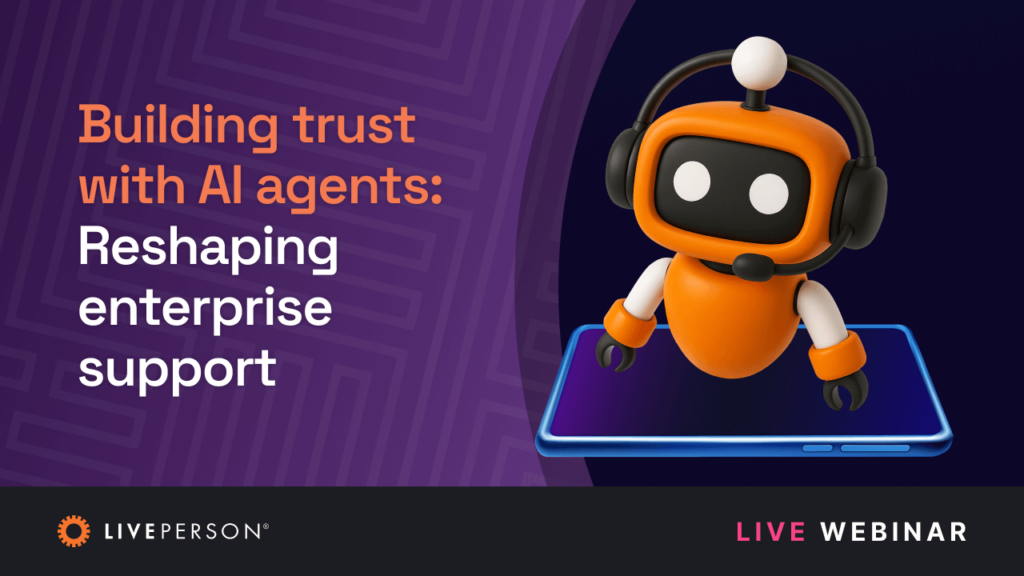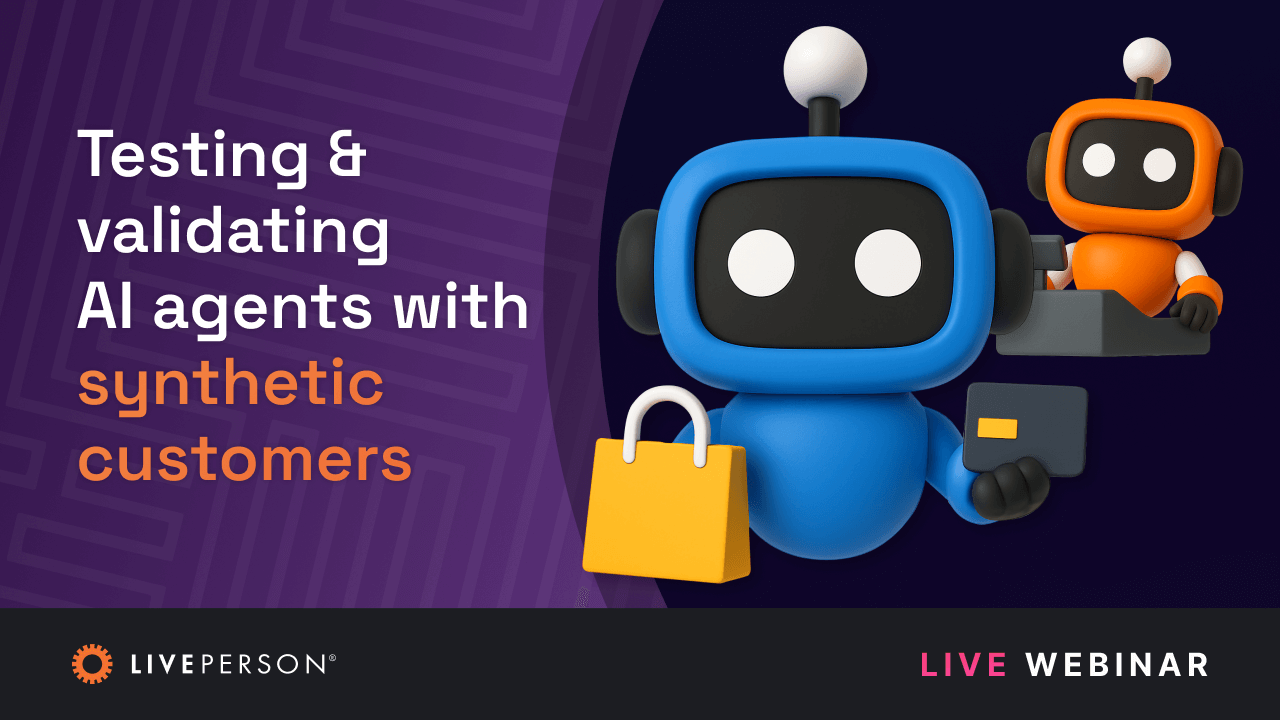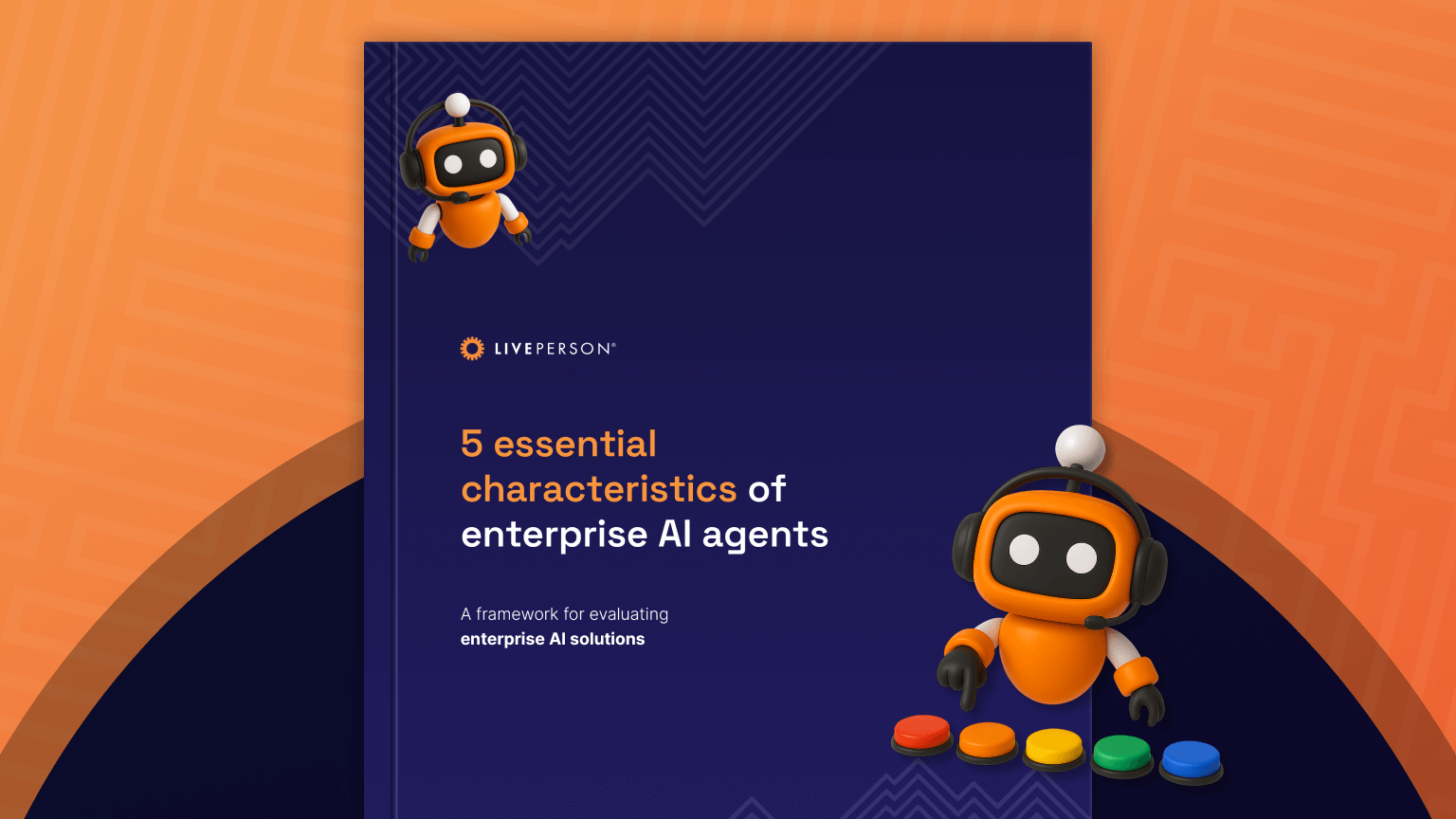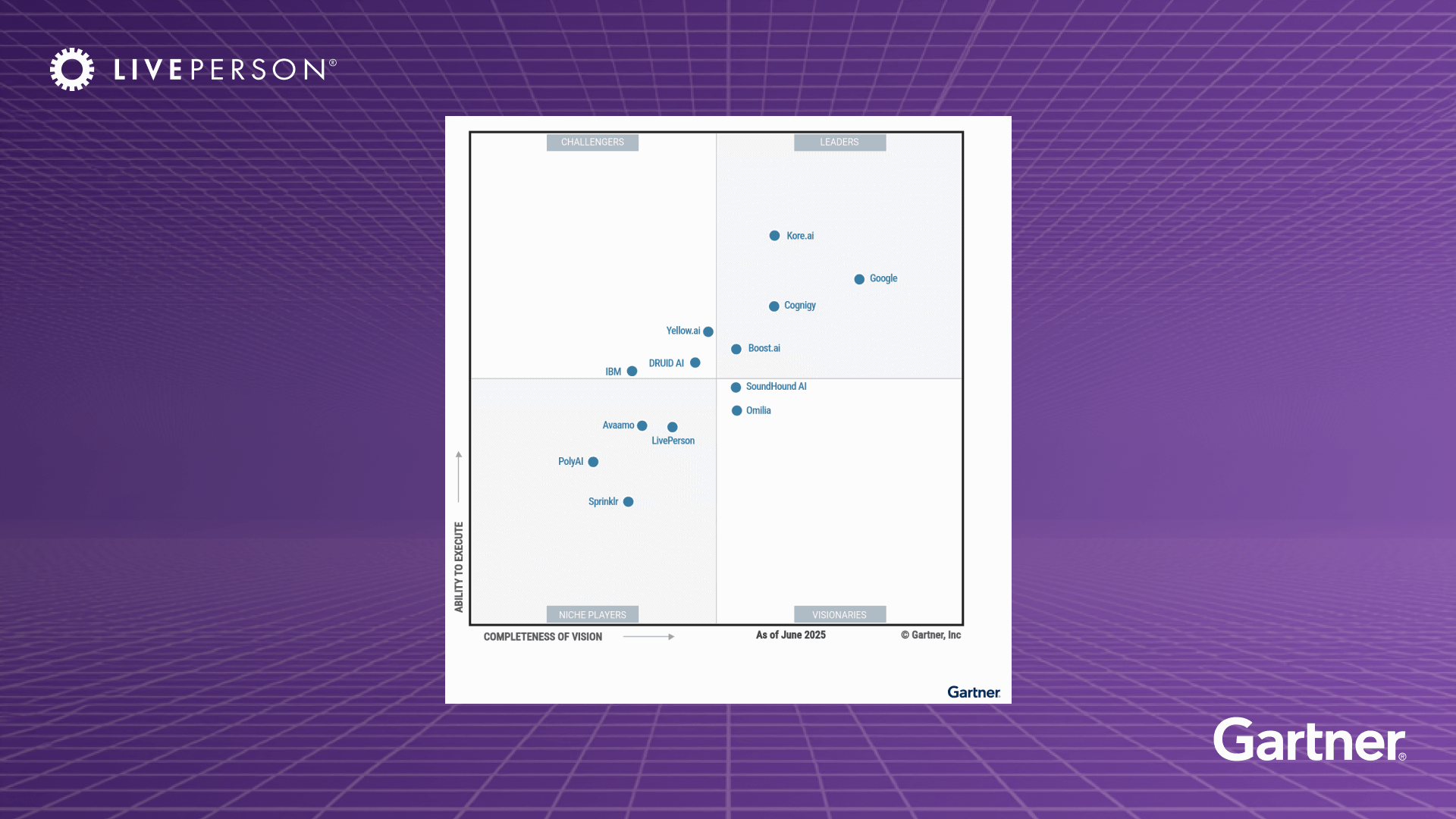article
What are AI agents really — and why they’re reshaping the future of CX
An artificial intelligence (AI) agent autonomously performs tasks on behalf of a user or system and is capable of problem solving and understanding context.
May 01, 2025 • 6 minutes
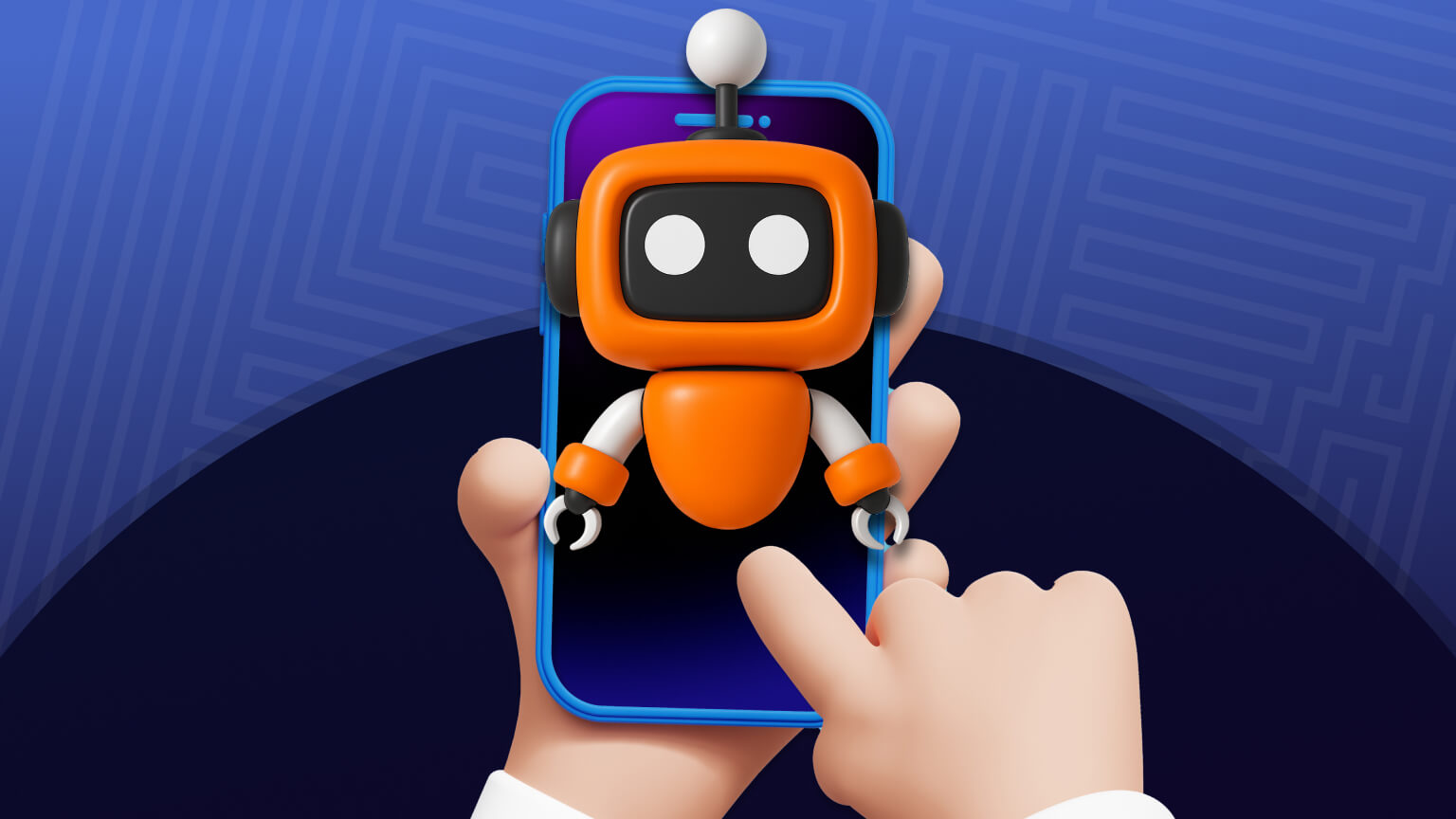
The customer experience landscape faces a growing contradiction. Customer expectations continue to rise while companies struggle to scale personalized service. The paradox? Customers want instant, 24/7 support, but they also demand trusted and friendly conversations with accurate information that deliver quick resolutions. Traditional AI chatbots have failed to bridge this gap, and their rigid, script-based approach often creates frustrating experiences that feel mechanical and fail to yield the intended resolutions.
At LivePerson, we’re seeing this challenge firsthand across industries and have pioneered an approach that goes beyond simple automation: advanced AI agents. What are AI agents? They don’t just follow scripts or navigate decision trees with natural language processing. These intelligent agents understand context, reason through problems, and make autonomous decisions to perform tasks and deliver effective, trusted, and pleasant experiences that address customer intent 24/7, providing service comparable to humans but with zero wait time and always-on availability.
Not all AI agents are created equal, however.
With the rise in popularity, many companies have simply rebranded basic automation tools with a hint of artificial intelligence functionality. There’s also an increasingly realistic but still futuristic vision of completely autonomous agents that operate without human input or supervision. LivePerson operates in the practical middle ground — building AI agents for business that have the freedom to create more efficient, effective, and natural-feeling experiences for consumers while operating within pre-defined constraints.
But what exactly makes these types of AI agents different from traditional automation? How are they reshaping customer engagement? And most importantly, how can these technologies help your brand create more genuine connections with customers while improving operational efficiency?
Let’s explore what defines an AI agent and how they’re fundamentally changing the customer experience landscape.
How AI agents work to transform customer conversations
AI agents leverage generative AI tools and large language models to conduct conversations that answer questions, resolve inquiries, and complete tasks with minimal or no human intervention. Unlike simple reflex agents or rules-based agents / chatbots that follow rigid pathways, our advanced AI agents evaluate and can reason over the best approach to resolve customer requests, including transferring to another AI assistant, bot, or human agent when necessary.
What truly sets an AI agent apart is the agent’s ability to adapt to novel conversational situations and automate complex tasks. These “learning agents” exist within our broader conversational ecosystem, enabling them to utilize metadata from past interactions and customer management systems (like CRM integrations) to create personalized experiences. In essence, AI agents represent a shift from static, scripted interactions to fluid, intelligent conversations that mirror human engagement.
5 key characteristics that differentiate a LivePerson AI agent
With AI agents becoming increasingly popular, many companies are rebranding basic automation with that term. However, true AI agents possess specific capabilities that differentiate them from standard chatbots. At LivePerson, ours are defined by five key characteristics:
1. Autonomy
LivePerson autonomous AI agents operate across a spectrum of autonomy and are able to make decisions based on context, historical interactions, and real-time data. This allows them to navigate repetitive tasks and complex customer scenarios without human oversight, choosing the most appropriate actions to resolve customer needs efficiently.
2. Personalization
AI agents analyze customer behavior, history, and preferences to identify patterns, delivering tailored responses and proactive assistance. This capability creates experiences that feel customized to each customer, increasing satisfaction and engagement through relevant, contextual interactions.
3. Conversational freedom
Unlike traditional chatbots, LivePerson AI agents don’t require conversations to follow specific flows or “rails.” Consumers can provide information and ask questions whenever they want, creating natural dialogues. This allows brands to design new automated experiences in minutes rather than months while enabling more natural customer interactions that achieve higher resolution rates.
4. Seamless collaboration
When faced with complex issues beyond their capabilities, a LivePerson AI agent can escalate to human agents while ensuring a smooth customer experience. They can also pick up where other agents (AI or human) left off, maintaining conversation continuity without forcing customers to repeat information.
5. Transparent controls
All LivePerson AI agent prompts and decision logic are fully accessible and customizable during design time. This transparency allows brands to customize, adapt, and deploy AI agents based on feedback and learnings without worrying about unseen prompts or instructions that might influence agent behavior.
What are AI agents compared to agentic AI?
It’s important to understand the relationship between AI agents and agentic AI. Agentic AI refers to the problem-solving advanced AI systems that leverage generative AI and multiple AI agents to achieve goals with varying degrees of autonomy.
In other words: Not all AI agents are agentic, but agentic AI always incorporates an AI agent. (Note: Although this overview introduces agentic capabilities, we’ll dive deeper into the topic in an upcoming blog focused on agentic AI.)
At LivePerson, an AI agent is considered agentic if it has:
- A goal that requires planning and faces situations where the next step isn’t obvious.
- A set of choices (e.g., tools) that allow the agent to interact with the environment in novel ways.
- A reasoning mechanism to select among those choices.
- An understanding of whether it has achieved its assigned goal.
But not every situation requires agentic capabilities. For example, a knowledge-based AI agent might work effectively without autonomy, instead functioning within an agentic ecosystem alongside other types of AI agents that do have agency. In such cases, the entire system is agentic, even if individual components or lower-level agents aren’t.
AI agent examples: When to use agentic capabilities
As noted above, an AI agent doesn’t need agentic capabilities to be effective. For straightforward, specific tasks like information retrieval or routing, non-agentic approaches can be more streamlined and efficient. However, for complex, multi-step customer journeys — like scheduling a test drive that matches customer preferences — agentic capabilities provide valuable advantages.
Consider this real-world example: An agentic AI agent for automotive test drives would have the specific goal of matching customers with vehicles they’ll love and scheduling convenient test drives. The goal-based agent would use a series of tools and decision points:
- Ask preference questions about budget, vehicle type, and features.
- Cross-reference industry data to identify matching vehicles.
- Gauge customer reactions to recommendations, adjusting suggestions as needed.
- Access a scheduling API to check availability.
- Confirm appointment details and send follow-up information.
This approach solves the real customer problem of finding the right vehicle and scheduling time to experience it, rather than simply showcasing technology for technology’s sake.
The role of AI agents in LivePerson’s ecosystem
LivePerson’s AI agents power intelligent, resolution-focused customer interactions that build brand loyalty while reducing operational cost across industries, including:
- Retail & E-commerce: Handling product recommendations based on customer preferences and purchase history, providing real-time order tracking updates, and facilitating hassle-free returns.
- Financial services: Assisting with fraud detection protocols that protect customer assets, addressing account inquiries with personalized responses, and streamlining payment processing workflows to enhance efficiency.
- Healthcare: Managing appointment scheduling, answering health-related customer queries within compliance guidelines, and providing timely reminders to improve patient outcomes.
- Telecommunications: Troubleshooting connectivity issues, providing step-by-step technical support, and offering recommendations based on customer usage.
By embedding AI agents into customer service workflows, LivePerson enhances efficiency, improves user satisfaction, and reduces operational costs.
Transform your customer experience with AI agents
An AI agent represents a significant advancement in customer engagement by combining intelligence, adaptability, and conversational capabilities. As businesses continue to adopt AI solutions and technology, having the right approach to AI agents can help provide meaningful, efficient, and human-like interactions at scale.
Ready to explore how this AI agent approach might enhance your CX strategy? Watch the webinar to learn more
